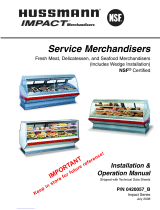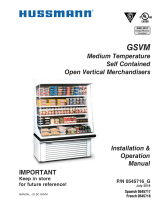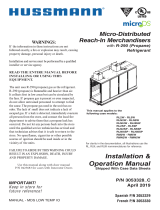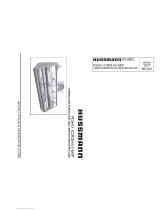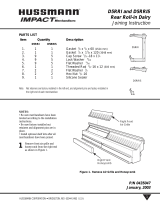Page is loading ...

VRL (120V)
Low Temperature Self Contained
Glass Door Merchandisers
with R-290 Refrigerant
Installation &
Operation Manual
Spanish 3155542
®
Æ
MANUAL - SELF CONTAINED R290 VRL 120V I/O
WARNINGS:
If the information in these instructions are not followed
exactly, a fire or explosion may result, causing property
damage, personal injury or death.
Installation and service must be performed by a qualified
installer or service agency.
READ THE ENTIRE MANUAL BEFORE
INSTALLING OR USING THIS EQUIPMENT.
The unit uses R-290 gas as the refrigerant. R-290 is
flammable and heavier than air. It collects first in low
areas but can be circulated by the fans. If propane gas
is present or even suspected, do not allow untrained
personnel to attempt to find the cause. The propane
gas used in the unit has no odor. The lack of smell does
not indicate a lack of escaped gas. If a leak is detected,
immediately evacuate all persons from the store, and
contact the local fire department to advise them that
a propane leak has occurred. Do not let any persons
back into the store until the qualified service technician
has arrived and that technician advises that it is safe to
return to the store. No open flames, cigarettes or other
possible sources of ignition should be used inside or in
the vicinity of the units.
FAILURE TO ABIDE BY THIS WARNING COULD
RESULT IN AN EXPLOSION, DEATH, INJURY AND
PROPERTY DAMAGE.
IMPORTANT
Keep in store for future reference!
P/N 3155541_C
April 2022

2 InstallatIon
PN_3155541_C U.S. & Canada 1-800-922-1919 • Mexico 1-800-890-2900 • www.hussmann.com
BEFORE YOU BEGIN
Read these instructions completely and carefully.
PERSONAL PROTECTION EQUIPMENT (PPE)
Personal Protection Equipment (PPE) is required whenever installing or servicing this
equipment. Always wear safety glasses, gloves, protective boots or shoes, long pants, and a
long-sleeve shirt.
1. If the information in these instructions is not followed exactly, a fire or explosion may result, causing property damage, personal
injury or death.
2. Installation and service must be performed by a qualified installer or service agency.
3. This unit is designed only for use with R-290 gas as the designated refrigerant.
THE REFRIGERANT LOOP IS SEALED. ONLY A QUALIFIED TECHNICIAN SHOULD ATTEMPT TO SERVICE!
• Propane is flammable and heavier than air.
• It collects first in the low areas but can be circulated by the fans.
• If R-290 (propane) is present or even suspected, do not allow untrained personnel to attempt to find the cause.
• The propane gas used in the unit has no odor.
• The lack of smell does not indicate a lack of escaped gas.
• If a leak is detected, immediately evacuate all persons from the store, and contact the local fire department to advise them that a
pro pane leak has occurred.
• Do not let any persons back into the store until the qualified service technician has arrived and that technician advises that it is
safe to return to the store.
• A hand-held propane leak detector (“sniffer”) shall be used before any repair and/or maintenance.
• No open flames, cigarettes or other possible sources of ignition should be used inside the building where the units are located
until the qualified service technician and/or local fire department determines that all propane has been cleared from the area and
from the refrigeration systems.
• Component parts are designed for propane and non-incendive and non-sparking. Component parts shall only be replaced with
identical repair parts.
FAILURE TO ABIDE BY THIS WARNING COULD RESULT IN AN EXPLOSION, DEATH, INJURY AND PROPERTY DAMAGE.
U.S. & Canada 1-800-922-1919 • Mexico 1-800-890-2900 • www.hussmann.com

PN_3155541_C 3
HUSSMANN CORPORATION • BRIDGETON, MO 63044-2483 U.S.A. VRL Merchandisers
IMPORTANT
KEEP IN STORE FOR FUTURE REFERENCE
Quality that sets industry standards!
12999 St. Charles Rock Road • Bridgeton, MO 63044-2483
U.S. & Canada 1-800-922-1919 • Mexico 1-800-890-2900
www.hussmann.com
© 2022 Hussmann Corporation
Merchandiser must operate for 24 hours
before loading product!
Regularly check merchandiser temperatures.
Do not break the cold chain. Keep products
in freezer before loading into merchandiser.
These merchandisers are designed
for only pre-frozen products.
AT TENTION
Merchandiser must operate for 24 hours
before loading product!
Regularly check merchandiser temperatures.
Do not break the cold chain. Keep products in
freezer before loading into merchandiser.
These merchandisers are designed
for only pre-frozen products.

4 InstallatIon
PN_3155541_C U.S. & Canada 1-800-922-1919 • Mexico 1-800-890-2900 • www.hussmann.com
REVISION HISTORY
REVISION C
Added 3-door case; added service replacement info for inverter, condenser motor, compres-
sor, and solenoid valves
REVISION B
Added the 2-door case
ORIGINAL ISSUE — NOVEMBER 2021
* * * * * * * * * * * * * * * * * * * * * * * * * *
ANSI Z535.5 DEFINITIONS
• DANGER – Indicate[s] a hazardous
situation which, if not avoided, will
result in death or serious injury.
• WARNING – Indicate[s] a hazardous
situation which, if not avoided, could
result in death or serious injury.
• CAUTION – Indicate[s] a hazardous
situation which, if not avoided, could
result in minor or moderate injury.
• NOTICE – Not related to personal injury –
Indicates[s] situations, which if not avoided,
could result in damage to equipment.
Do NOT remove shipping crate until the
merchandiser is positioned
for installation.
Excessive ambient conditions may
cause condensation and therefore
sweating of doors. Facility operators
should monitor doors and oor
conditions to ensure safety of persons.
Adjust closing torque by turning the bottom
hinge pin in the direction the door closes.
Use a 1/2 inch (13 mm) wrench, and turn
the hinge pin until the door closes on its own.
Usually it takes two clicks or a half turn.
AT TENTION This warning does not mean that Hussmann products
will cause cancer or reproductive harm, or is in
violation of any product-safety standards or
requirements. As clarified by the California State
government, Proposition 65 can be considered more of
a ‘right to know’ law than a pure product safety law.
When used as designed, Hussmann believes that our
products are not harmful. We provide the Proposition
65 warning to stay in compliance with California State
law. It is your responsibility to provide accurate
Proposition 65 warning labels to your customers when
necessary. For more information on Proposition 65,
please visit the California State government website.
August 31, 2018
Case ventilation openings must be clear
of any obstructions. Do not damage the
refrigerant circuit.

PN_3155541_C 5
HUSSMANN CORPORATION • BRIDGETON, MO 63044-2483 U.S.A. VRL Merchandisers
NSF LISTING
These merchandisers are manufactured to meet
ANSI / UL 471 standard requirements for
safety. Proper installation is required to maintain
this listing. Near the serial plate, each case
carries a label identifying the type of conditions
for which the merchandiser was tested.
ANSI/NSF-7 Type II – Display
Refrigerator / Freezer Intended for
80°F / 55% RH Ambient Application
ANSI/NSF-7 – Display Refrigerator
Intended for Bulk Produce
FEDERAL / STATE REGULATION
These merchandisers, at the time they are
manufactured, meet all federal and state /
provincial regulations.
HUSSMANN PRODUCT CONTROL
The serial number and shipping date of all
equipment is recorded in Hussmann’s files
for warranty and replacement part purposes.
All correspondence pertaining to warranty or
parts ordering must include the serial number
of each piece of equipment involved. This is
to ensure the customer is provided with the
correct parts.
SHIPPING DAMAGE
All equipment should be thoroughly examined
for shipping damage before and during
unloading. This equipment has been carefully
inspected at our factory. Any claim for loss
or damage must be made to the carrier. The
carrier will provide any necessary inspection
reports and/or claim forms.
Apparent Loss or Damage
If there is an obvious loss or damage, it must
be noted on the freight bill or express receipt
and signed by the carrier’s agent; otherwise,
carrier may refuse claim.
Concealed Loss or Damage
When loss or damage is not apparent until
after equipment is uncrated, retain all packing
materials and submit a written response to the
carrier for inspection within 15 days.
LOCATION
These merchandisers are designed for
displaying products in air conditioned stores
where temperature is maintained at or below
the ANSI / NSF-7 specified level and relative
humidity is maintained at or below 55%.
Placing refrigerated merchandisers in direct
sunlight, near hot tables or near other heat
sources could impair their efficiency. Like
other merchandisers, these merchandisers
are sensitive to air disturbances. Air currents
passing around merchandisers will seriously
impair their operation. Do NOT allow air
conditioning, electric fans, open doors or
windows, etc. to create air currents around the
merchandiser.
Recommended operating ambient
temperature is between
60°F (15.6°C) to 80°F (26.7°C).
Maximum relative humidity is 55%.
INSTALLATION

6 InstallatIon
PN_3155541_C U.S. & Canada 1-800-922-1919 • Mexico 1-800-890-2900 • www.hussmann.com
SELF CONTAINED (LOCATION)
Product should always be maintained at proper temperature. This means that from the time the
product is received, through storage, preparation and display, the temperature of the product
must be controlled to maximize the life of the product.
Be sure to position self contained merchandisers properly.
VRL models have vented base panels to allow air circulation through the condensing unit.
Allow for a minimum 36 in. clearance in the front. Blocking or restricting air flow will adversely
affect performance and may damage the refrigeration system.
36 in.
36 in.
36 in.
Air
Exhaust
Air
Exhaust
Front Rear
Zero Clearance
at Sides and Rear
36 in. Clearance
at Front
(Plan View)
Front Rear
Zero Clearance
at Sides and Rear
36 in. Clearance
at Front
(Plan View)
Front Rear
Zero Clearance
at Sides and Rear
36 in. Clearance
at Front
(Plan View)
Air Exhaust
Air Exhaust
Air Exhaust
Air Intake
Air Intake
FUk YUOUI
36 in.
Air Intake
Front Rear
(Plan View)
Zero clearance required on sides
1-inch clearance at TOP and REAR
36 in. Clearance at
Front

PN_3155541_C 7
HUSSMANN CORPORATION • BRIDGETON, MO 63044-2483 U.S.A. VRL Merchandisers
UNLOADING
Unloading from Trailer:
Lever Bar (also known as a Mule, Johnson
Bar, J-Bar, Lever Dolly, or Pry Lever)
Move the merchandiser as close as possible
to its permanent location and remove
all packaging. Check for damage before
discarding packaging. Remove all separately
packed accessories such as kits and shelves.
Improper handling may cause damage to
the merchandiser when unloading. To avoid
damage:
1. Do not drag the merchandiser out of the
trailer. Use a Johnson bar (Mule).
2. Use a forklift or dolly to remove the
merchandiser from the trailer.
EXTERIOR LOADING
Do NOT walk on top of the merchandiser or
damage to the merchandisers and serious
personal injury could occur.
merchandisers are not structurally
designed to support excessive external
loading such as the weight of a person.
Do not place heavy objects on the
merchandiser.
SHIPPING SKID
Each merchandiser is shipped on a skid to
protect the merchandiser’s base and to make
positioning the case easier.
Remove the top of the crate and detach walls
from each other (if applicable). Lift crate from
the skid. Unscrew the case from the skid. The
merchandiser can now be lifted off the crate
skid. Lift only at base of skid! Remove any
braces and/or skids attached (blanket wrapped
merchandiser may have skids).
DO NOT TILT MERCHANDISER ON ITS
SIDE OR END WHEN REMOVING SKID.
Once the skid is removed, the merchandiser
must be lifted —NOT PUSHED— to
reposition. To remove the skid, remove screws
attaching skid to the merchandiser.
Check floor where merchandisers are to be set
to if it is a level area. Determine the highest
part of the floor.
Do NOT stand or walk on top of
merchandiser. Do not store items or
ammable materials atop the unit.
Case ventilation openings must be clear of any
obstructions. Do not damage the refrigerant
circuit.
Do not use mechanical devices or other means
to accelerate the defrosting process.
Do not use electrical appliances inside the food
storage compartments of the case.

8 InstallatIon
PN_3155541_C U.S. & Canada 1-800-922-1919 • Mexico 1-800-890-2900 • www.hussmann.com
MODEL DESCRIPTION
VRL merchandisers are low temperature self-
contained cabinets, designed for pre-packaged
frozen food or products that require frozen
temperatures for conservation.
Design Features:
- Contemporary styling places maximum
attention on merchandising
- All VRL merchandisers have the same access
panel design for commonality between
merchandisers
- Self-closing Innovator doors. Positive seal,
torsion type closure system
- Triple-pane thermal insulated glass door
assemblies
- Magnetic door gaskets of one-piece
construction, removable without tools for
ease of cleaning
- Merchandiser can be placed against wall -
no air gap is required behind the case
- Digital display in center of case air grille
CABINET LEVELING
This merchandiser must be installed level
(from back to front, and side to side) to allow
maximum draining of the condensate water as
well as proper door alignment and operation.
Choose a level area to install case.
These cases have adjustable leg leveler at
center front and back. Turn the leg levelers
clockwise to add length to each leg for leveling.
Adjustable
Leg Levelers
GDF 3.0 SHEET SIZE D
NOTES:
1. APPLICABLE STANDARDS / SPECIFICATIONS
ASME Y14.5M-1994, DIMENSIONS AND TOLERANCES
2. KEY PRODUCT CHARACTERISTICS PER EPR-0006 & IDENTIFIED WITH SYMBOL
3. MATERIAL-
4. REF -
K
SHEET 2 OF 12
P/N REV
THIRD
ANGLE
PROJECTION
UNLESS OTHERWISE SPECIFIED
DIMENSIONS ARE IN INCHES.
R
A
A
SECTION A-A
INSTALLATION

PN_3155541_C 9
HUSSMANN CORPORATION • BRIDGETON, MO 63044-2483 U.S.A. VRL Merchandisers
CASTERS
When optional casters are used, screw them
tight to the merchandiser base. Once in final
position, lock each caster. This option is a
ship loose kit. As a standard offering, this
merchandiser is fabricated with hockey puck
style leveler.
FIELD REQUIRED TOOLS
Pry (J) bar to lift up case to remove leg levelers.
Make sure the adjustable wrench used has a
minimum opening of 2 5/16".
83.19
CASTERS
83.19
CASTERS
83.19"
(1-door model shown)
Case height is the same for
1, 2 and 3-door case models

10 InstallatIon
PN_3155541_C U.S. & Canada 1-800-922-1919 • Mexico 1-800-890-2900 • www.hussmann.com
SHELF AND WIRE PRODUCT STOP
INSTALLATION
After the cabinet is leveled, the shelves may
be installed. Wire shelves are adjustable.
Shelf spacing can be adjusted by positioning
the shelf clips according to individual loading
requirements.
VRL merchandisers have four movable wire
shelves and one bottom wire shelf per door
as a standard option. Extra shelves can be
ordered as optional kits.
LAMPS
The light switch for the lamps is located at the
top of the fan plenum on the righthand side as
shown below. The switch controls the display
lighting and interior lighting.
Shelves
Bottom Shelf
11/29/2021
Light Switch
Light Switch
GDF 3.0 SHEET SIZE D
NOTES:
1. APPLICABLE STANDARDS / SPECIFICATIONS
ASME Y14.5M-1994, DIMENSIONS AND TOLERANCES
2. KEY PRODUCT CHARACTERISTICS PER EPR-0006 & IDENTIFIED WITH SYMBOL
3. MATERIAL-
4. REF -
K
SHEET 15 OF 15
P/N REV
THIRD
ANGLE
PROJECTION
UNLESS OTHERWISE SPECIFIED
DIMENSIONS ARE IN INCHES.
R
(1-door model shown) light switch location is
in similar location for all models - righthand
side of the fan plenum

PN_3155541_C 11
HUSSMANN CORPORATION • BRIDGETON, MO 63044-2483 U.S.A. VRL Merchandisers
Load Limit for VRL
Merchandisers
STOCKING
Product should NOT be placed in case until merchandiser is at proper operating temperature.
The VRL merchandisers must remain in operation for at least 24 hours before product may be
loaded into case cabinet. Proper rotation of product during stocking is necessary to prevent
product loss. Always bring the oldest product to the front and set the newest to the back.
Air exhAust And return grille must remAin open And free of obstruction At All times.
Do not allow product, packages, signs, etc. to block air exhaust or return grille. Do not use
non-approved shelving, baskets, display racks, or any accessory that could hamper air curtain
performance.
GDF 3.0 SHEET SIZE D
NOTES:
1. APPLICABLE STANDARDS / SPECIFICATIONS
ASME Y14.5M-1994, DIMENSIONS AND TOLERANCES
2. KEY PRODUCT CHARACTERISTICS PER EPR-0006 & IDENTIFIED WITH SYMBOL
3. MATERIAL-
4. REF -
K
SHEET 3 OF 12
P/N REV
THIRD
ANGLE
PROJECTION
UNLESS OTHERWISE SPECIFIED
DIMENSIONS ARE IN INCHES.
R
LOAD LIMIT LINE
SECTION A-A
A
A
54.75
LOAD LIMITS
Product must be within designated load limit
to ensure proper refrigeration and air curtain
performance.
do not violAte the loAd limit lines of vrl
cAses. product will block the cold Air
flow.

12 InstallatIon
PN_3155541_C U.S. & Canada 1-800-922-1919 • Mexico 1-800-890-2900 • www.hussmann.com
Hussmann Self-Contained Refrigeration Equipment Start Up Check List
***Please note that failure to follow this start-up document may void your factory warranty***
Form HSCW01 Rev. 30MAY12 P/N 0525209_B
LEGAL DISCLAIMER:
Hussmann shall not be liable for any repair or replacements made without the written consent of Hussmann, or when the product is installed or operated in
a manner contrary to the printed instructions covering installation and service which accompanied such product.
Step Startup Activity Check
1 Locate, read and maintain install/operation manual in a safe place for
future reference.
2 Examine unit. Conrm there is NO damage or concealed damage.
3 Level the unit, side to side and front to rear.
4 Remove all shipping brackets/compressor straps/bolts etc.
5 Unit must be run on a dedicated electrical circuit without the use of an
extension cord.
6 Ensure that the proper electrical requirements for the equipment are
supplied.
7 Verify eld electrical connections are tight.
8 Verify all electrical wiring is secured and clear of any sharp edges or
hot lines.
9 Verify the condensate drain line is properly trapped and pitched. Ensure
condensate drain tube is properly located against condensate pan.
10 Verify all required clearances on the sides and back of unit.
11 Verify there are no air disturbances external to the unit. Heat and air
registers, fans, and doors etc.
Advise owner/operator that merchandiser must operate at temperature for 24 hrs prior to
loading with product.

HUSSMANN CORPORATION • BRIDGETON, MO 63044-2483 U.S.A. VRL Merchandisers
PN_3155541_C 13
PLUG
These merchandisers use a single, 9 ft. power
cord and plug.
1 and 2-door case models use a NEMA 5-15P
(plug). 3-door models use a NEMA 5-20P.
The plug is located on the right-hand side at the
rear of the merchandiser.
Disconnect power before servicing. VRL
merchandisers require a dedicated electrical
circuit with ground. 12AWG is the minimum-
sized acceptable wire.
• Always use a dedicated circuit with the
amperage stated on the unit.
• Plug into an outlet designed for the plug.
• Do not overload the circuit.
• Never use extension cords or adapters.
• If in doubt, call an electrician.
— LOCK OUT / TAG OUT —
To avoid serious injury or death from electrical shock, always
disconnect the electrical power at the main disconnect when
servicing or replacing any electrical component. This includes,
but is not limited to, such items as doors, lights, fans, heaters,
and thermostats.
ALWAYS CHECK THE SERIAL PLATE FOR
COMPONENT AMPERES
Risk of Electric Shock. If cord or plug
becomes damaged, replace only with
a cord and plug of the same type.
Merchandiser must be grounded.
Do not remove the power supply cord ground.
ELECTRICAL / REFRIGERATION / CONTROLLER
Nominal
Voltage
Minimum
Voltage
Maximum
Voltage
110-120 110 120
NEMA 5-15P
115V 60Hz
(1 and 2-door
case models)
GDF 3.0 SHEET SIZE D
NOTES:
1. APPLICABLE STANDARDS / SPECIFICATIONS
ASME Y14.5M-1994, DIMENSIONS AND TOLERANCES
2. KEY PRODUCT CHARACTERISTICS PER EPR-0006 & IDENTIFIED WITH SYMBOL
3. MATERIAL-
4. REF -
K
SHEET 4 OF 12
P/N REV
THIRD
ANGLE
PROJECTION
UNLESS OTHERWISE SPECIFIED
DIMENSIONS ARE IN INCHES.
R
NEMA 5-15P
115V 60 HZ
NEMA 5-20P
115V 60Hz
(3-door case
models)

PN_3155541_C U.S. & Canada 1-800-922-1919 • Mexico 1-800-890-2900 • www.hussmann.com
14 ElEctrIcal / rEfrIgEratIon / controllEr
GDF 3.0 SHEET SIZE D
SHEET 12 OF 16
P/N REV
THIRD
ANGLE
PROJECTION
UNLESS OTHERWISE SPECIFIED
DIMENSIONS ARE IN INCHES.
R
B
VRLB1A CASES GENERAL DIMENSIONS
General dimensions 1 DOOR 2 DOOR 3 DOOR
Case Lenght (A) 29 5/8 (752) 54 (1372) 78 1/4 (1988)
Power cord outlet (B) 14 3/4 (375) 2 3/4 (70) 2 3/4 (70)
Electrical box (C) RIGHT RIGHT CENTER
A
ELECTRICAL BOX 2 & 3 DOORS
LOCATION MARKED IN TABLE
AS CENTER OR RIGHT
31.75 31.26
VRL1B1A ELECTRICAL BOX
POSITON
GDF 3.0 SHEET SIZE D
SHEET 12 OF 16
P/N REV
THIRD
ANGLE
PROJECTION
UNLESS OTHERWISE SPECIFIED
DIMENSIONS ARE IN INCHES.
R
B
VRLB1A CASES GENERAL DIMENSIONS
General dimensions 1 DOOR 2 DOOR 3 DOOR
Case Lenght (A) 29 5/8 (752) 54 (1372) 78 1/4 (1988)
Power cord outlet (B) 14 3/4 (375) 2 3/4 (70) 2 3/4 (70)
Electrical box (C) RIGHT RIGHT CENTER
A
ELECTRICAL BOX 2 & 3 DOORS
LOCATION MARKED IN TABLE
AS CENTER OR RIGHT
31.75 31.26
VRL1B1A ELECTRICAL BOX
POSITON
ELECTRICAL BOX & POWER CORD LOCATION

HUSSMANN CORPORATION • BRIDGETON, MO 63044-2483 U.S.A. VRL Merchandisers
PN_3155541_C 15
REFRIGERATION SYSTEM
FUNCTIONALITY
These cases can be used for frozen food. These
merchandiser model is self-contained and has
a controller that automates the refrigeration
cycle and the defrost cycle.
During refrigeration mode, the discharge line
solenoid valve (RSV) is energized and held
open, allowing the gas to flow through the
condenser.
Once the refrigerant is in a liquid state, a
capillary tube is used as an expansion device
that feeds the evaporator.
During refrigeration mode, hot gas solenoid
valve (HGSV) is deenergized and closed.
Figure A. System Diagram- Refrigeration Mode
(This diagram is applicable for both 1 and 2-door models)
GDF 3.0 SHEET SIZE D
NOTES:
1. APPLICABLE STANDARDS / SPECIFICATIONS
ASME Y14.5M-1994, DIMENSIONS AND TOLERANCES
2. KEY PRODUCT CHARACTERISTICS PER EPR-0006 & IDENTIFIED WITH SYMBOL
3. MATERIAL- Error: No reference
4. REF -
K
SHEET 1 OF 2
P/N REV
THIRD
ANGLE
PROJECTION
UNLESS OTHERWISE SPECIFIED
DIMENSIONS ARE IN INCHES.
R
REVISION HISTORY
REV ECN DATE REVISION DESCRIPTION REV BY CHKD BY APPR BY
FILTER
DRIER CAP TUBE
CHECK
VALVE
EVAPORATOR
CONDENSER
CONDENSATE PAN
HGSV
RSV COMPRESSOR
REFRIGERATION
PRESSURE
SWITCH

PN_3155541_C U.S. & Canada 1-800-922-1919 • Mexico 1-800-890-2900 • www.hussmann.com
16 ElEctrIcal / rEfrIgEratIon / controllEr
Figure B. System Diagram- Refrigeration Mode
(This diagram is applicable for 3-door models)
GDF 3.0 SHEET SIZE D
NOTES:
1. APPLICABLE STANDARDS / SPECIFICATIONS
ASME Y14.5M-1994, DIMENSIONS AND TOLERANCES
2. KEY PRODUCT CHARACTERISTICS PER EPR-0006 & IDENTIFIED WITH SYMBOL
3. MATERIAL- Error: No reference
4. REF -
K
SHEET 3 OF 4
P/N REV
THIRD
ANGLE
PROJECTION
UNLESS OTHERWISE SPECIFIED
DIMENSIONS ARE IN INCHES.
R
FILTER
DRIER CAP TUBE
CHECK
VALVE
EVAPORATOR
CONDENSER
CONDENSATE PAN
HGSV
RSV
COMPRESSOR
PRESSURE
SWITCH
FILTER DRIER CAP TUBE
CHECK
VALVE
CONDENSER
CONDENSATE PAN
HGSV
RSV
COMPRESSOR
PRESSURE
SWITCH
REFRIGERATION

HUSSMANN CORPORATION • BRIDGETON, MO 63044-2483 U.S.A. VRL Merchandisers
PN_3155541_C 17
Figure C. System Diagram - Defrost Mode - Hot Gas Bypass
(This diagram is applicable for both 1 and 2-door case models)
REFRIGERATION SYSTEM
FUNCTIONALITY (Continued)
During defrost mode, the defrost solenoid
valve (HGSV) is energized and held open
allowing the gas to be redirected through the
evaporator inlet. The evaporator is split and
circuited for 2 refrigeration circuits.
Defrost cycle is temperature-terminated with
a failsafe that is 50 minutes. Normally only 3
defrost per day are required.
GDF 3.0 SHEET SIZE D
NOTES:
1. APPLICABLE STANDARDS / SPECIFICATIONS
ASME Y14.5M-1994, DIMENSIONS AND TOLERANCES
2. KEY PRODUCT CHARACTERISTICS PER EPR-0006 & IDENTIFIED WITH SYMBOL
3. MATERIAL- Error: No reference
4. REF -
K
SHEET 2 OF 2
P/N REV
THIRD
ANGLE
PROJECTION
UNLESS OTHERWISE SPECIFIED
DIMENSIONS ARE IN INCHES.
R
FILTER
DRIER CAP TUBE
CHECK
VALVE
EVAPORATOR
CONDENSER
CONDENSATE PAN
HGSV
RSV COMPRESSOR
DEFROST
PRESSURE
SWITCH

PN_3155541_C U.S. & Canada 1-800-922-1919 • Mexico 1-800-890-2900 • www.hussmann.com
18 ElEctrIcal / rEfrIgEratIon / controllEr
GDF 3.0 SHEET SIZE D
NOTES:
1. APPLICABLE STANDARDS / SPECIFICATIONS
ASME Y14.5M-1994, DIMENSIONS AND TOLERANCES
2. KEY PRODUCT CHARACTERISTICS PER EPR-0006 & IDENTIFIED WITH SYMBOL
3. MATERIAL- Error: No reference
4. REF -
K
SHEET 4 OF 4
P/N REV
THIRD
ANGLE
PROJECTION
UNLESS OTHERWISE SPECIFIED
DIMENSIONS ARE IN INCHES.
R
DEFROST
FILTER
DRIER CAP TUBE
CHECK
VALVE
EVAPORATOR
CONDENSER
CONDENSATE PAN
HGSV
RSV
COMPRESSOR
PRESSURE
SWITCH
FILTER DRIER CAP TUBE
CHECK
VALVE
CONDENSER
CONDENSATE PAN
HGSV
RSV
COMPRESSOR
PRESSURE
SWITCH
Figure D. System Diagram - Defrost Mode - Hot Gas Bypass
(This diagram is applicable for 3-door case models)

HUSSMANN CORPORATION • BRIDGETON, MO 63044-2483 U.S.A. VRL Merchandisers
PN_3155541_C 19
Before Beginning Any Service or Repair:
Use a hand-held propane leak detector (“sniffer”)
to ensure no propane is present in the immediate
area, the inside of the display case and the inside
of the refrigeration system. R-290 is an odorless
refrigerant. Keep the area clear of all customers
and non-essential or unauthorized personnel.
Verify that all repair parts are identical models
to the ones they are replacing. Do not substitute
parts such as motors, switches, relays, heaters,
compressors, power supplies or solenoids.
Failure to do so can result in an explosion,
death, injury and property damage. Parts
used on hydrocarbon cases must meet specic
UL certication for non-incendive or non-
sparking components. Use only Hussmann
approved parts approved through the Hussmann
Performance Parts Website. https://parts.
hussmann.com/
Brazing must not begin before all propane has
been cleared from the immediate area — the
inside of the displays case and the inside of the
refrigeration system.
Only Hussmann or factory
trained technicians should
service or repair this R-290
(propane) equipment.
Failure to follow
instructions can result in
an explosion, death, injury
and property damage.
If a leak is detected, follow store safety
procedures. It is the store’s responsibility to have
a written safety procedure in place. The safety
procedure must comply with all applicable codes
such as local re department’s codes.
At minimum, the following actions are required:
• Immediately evacuate all persons from the
store, and contact the local re department to
advise them that a propane leak has occurred.
• Call Hussmann and/or a qualied service
agent and inform them that a propane sensor has
detected the presence of propane.
• Do not let any persons back into the store
until the qualied service technician has arrived
and that technician advises that it is safe to
return to the store.
• The propane gas used in the unit has no odor.
The lack of smell does not indicate a lack of
escaped gas.
• A hand-held propane leak detector
(“sniffer”) should be used before any repair and/
or maintenance is attempted. All repair parts
must be identical models to the ones they are
replacing.
• No open flames, cigarettes or other possible
sources of ignition should be used inside the
building where the units are located until the
qualied service technician and/or local re
department determines that all propane has been
cleared from the area and from the refrigeration
systems.

PN_3155541_C U.S. & Canada 1-800-922-1919 • Mexico 1-800-890-2900 • www.hussmann.com
20 ElEctrIcal / rEfrIgEratIon / controllEr
REPLACING REFRIGERATION SYSTEM
COMPONENTS
STEPS TO RECOVER REFRIGERANT
1. Make sure you are in a well ventilated area before
making any service or repair to the refrigeration
system.
2. Disconnect all power sources from the system.
Some systems may have more than one plug or
power supply.
3. Tap system with line tap valves, attaching gauges to
the high and low sides of the system.
4. Connect hose to an evacuated recovery tank.
Open refrigeration gauges and recovery tank.
5. With the suction valve in vacuum, the refrigerant will
be recovered into the recovery tank.
6. Once recovered, close the tank valve and remove
the guage from the tank and connect nitrogen tank
to the system to purge it with nitrogen.
7. Pull vacuum to a minimum of 200 microns or
lower.
Only Hussmann service technicians or
technicians qualied to handle R-290
(propane) refrigerant should service or
repair this R-290 (propane) equipment
Failure to follow instructions can result
in an explosion, death, injury and
property damage.
refrigeration
line tapping
valve
This refrigeration system uses hot
gas defrost and incorporates a Normal
Closed Solenoid. In order to remove
all the refrigerant for service, the valve
must be held open while the refrigerant
is being evacuated. Failure to remove
all the refrigerant can cause a re or
explosion.
/
